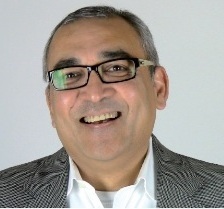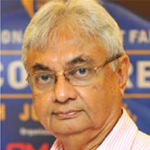
Bav Tailor
Designer
Label Bav Tailor
Following a philosophy of durability, quality and trend-free style
Born in London and Indian by origin, Bav Tailor is the Founder of her eponymous label. Her creations are a collective fusion of generation less silhouettes and effortless geometrical volumes inspired by design, architecture and Eastern philosophies crafted from wellness certified natural or recycled materials. In an interview with Fibre2Fashion, the designer throws light on the challenges she faced while creating a conscious luxury label and the differences she finds between European and Indian fashion markets.
Fibre2Fashion: What do you love the most about your lifestyle, why?
Bav Tailor:
My free-spiritedness. The freedom to work with good people who are conscious of their attitudes and actions, the flexibility to balance my work and personal life, but most of all to have a purpose project that instils respect within me and those that encircle me each passing day.
F2F: From being a nomad to a fashion designer, how was your journey and what lessons were learned?
BT:
F2F: What challenges have you experienced developing a brand with motive of conscious and sustainable clothing?
BT:
At the beginning, the biggest challenge was the limited availability of high quality certified sustainable materials and ethical production processes. The concept of sustainable fashion was stereo-typed as a cheap eco t-shirt made of hemp which after a few washes lost form, quality and colour. Hence my endeavour was to launch a ‘conscious luxury’ brand producing products that followed a philosophy of durability, quality and trend-free style. It was very difficult to find authentic suppliers and producers who truly understood the meaning of sustainability, not just in terms of certifications but in attitude.
F2F: How does the design and production process work to maintain eco–friendliness and where does the manufacturing happen?
BT:
The brand’s DNA is built around a 360° conscious manifesto”, stemming from the digital low waste design process, innovative materials, through to an ethical and transparent production chain through to inner ecology wellness rituals. The project pledges to reduce the brand’s carbon footprint whilst making social contributions through its memberships which endeavour to support the ‘United Nations Sustainable Development Goals’. Bav Tailor is a member of Positive Luxury [CSR brand 2020], awarded the Butterfly Mark for a company-wide commitment to sustainability, and Common Objective [CO Leader 2019], through the mantra ‘respect your body+ your sphere’. The brand encourages to respect your body through the wellness materials that adorn the skin, whilst nurturing the sphere that surrounds us. Ethical production is 100 per cent Made in Italy for main collection, whilst the Artisanal Lab capsule collaborations strives to support global artisans renowned for their unique local craft that currently includes collaborations in India, Lebanon and Kenya.
F2F: How would you define ageless silhouettes and what pantone shades would you prefer for your collection?
BT:
Each Bav Tailor creation is a collective fusion of gender-neutral, generation less silhouettes and effortless geometrical volumes inspired by design, architecture and Eastern philosophies crafted from wellness certified natural, innovative, or recycled materials.
F2F: How would you differentiate European market and Indian market and what changes can be done?
BT:
The European market seems to be attuned to discovering new international brands showcasing sustainable materials, avant-garde and understated silhouettes, and is requesting brands to become transparent in their sustainability road map. The concept of multi-brand retailers physical as well as digital, allows niche international brands to be discovered and expand internationally. Whilst the Indian market is rich in heritage and traditional craft techniques, with a very fast-forward fashion clientele who at present may steer more towards local designers or globally well-established brands. The focus on sustainability seems to be stemming more towards some Indian suppliers who are investing into conscious business models, creating purpose driven businesses which are trying to find solutions to the global climate issues being faced. I have heard some very inspiring stories of some Indian entrepreneurs which is truly heart-warming. For sure an increased focus on sustainability and enabling of technology will drive future growth for Indian craftsmen and women.
F2F: As your brand is collaborating with artisans and designers from all over the world, how do to manage to put things together and what complications were faced at the time of pandemic?
BT:
The pandemic gave me the opportunity to further discover some really beautiful talented artisans to collaborate with. To be honest, when you have an authentic synergy with an artisan or designer, there is a mutual respect between both parties to overcome any complications, which makes the collaboration even more fruitful. One of the key issues we had with one project was the shipment of items in time for my fashion week presentation in London, Milan and Paris. Therefore, we decided together to not just produce the hand block printed pieces on Lebanon but locally photograph and film the products which allowed us to narrate a better story of the Artisanal Lab project. This in turn provided international visibility not only to the artisans but also to the local talent from the photographer, director to the models as well as the location. Having one project that can showcase a culture and promote the local creative talent at all levels, becomes truly rewarding.
F2F: Share some tips for fashion enthusiasts who are willing to avoid fast fashion, but their habits and lifestyle is making it difficult.
BT:
The key is to make gradual changes. Firstly, our mindset needs to change. Focusing on trying to live a more conscious lifestyle through elevating your inner ecology is for sure the first step. How can you as a human-being become more responsible that goes beyond fashion, but through your everyday living. Once everyday habits start shifting towards a more conscious path, the next step will automatically arise. Shopping will be more efficient. The more clients start asking brands and retailers questions about the transparency of their product, the more investment brands and retailers will dedicate to sustainable practices and products. One of my life philosophies is not to be a sheep and follow others but lead responsibly with pride and hope through your best practices.
F2F: If you are allotted a wish, what would you ask for?
BT:
For my Bav Tailor holistic sphere to inspire all to think and act more consciously.
Abhay Gupta
Fanny Vermandel
Bill D’Arienzo
Anurag Batra
Pradip Mehta
Gabi Seligsohn
Aseem Prakash
Rahul Mehta
Arun Sirdeshmukh
Rahul Mehta


20230103183907.png)







_8.JPG)


